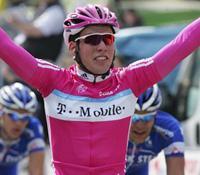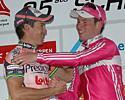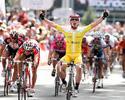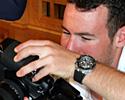
Recently on Cyclingnews.com |
An interview with Mark Cavendish - Part two, October 18, 2007
...continued from part one.
Talent, confidence and raw ambition; the mark of a champion
Mark Cavendish has made headlines for all the right reasons in 2007. He's taken an astonishing eleven wins in his debut pro season and, as the first signatory of the UCI's Riders' Commitment for a New Cycling, he has shown that he is part of a new generation so vital to the sport. In the second part of his interview, he speaks to Cyclingnews' Shane Stokes about chasing the green jersey, targeting Olympic success, his desire to surpass Robbie McEwen and the considerable respect he has for fellow T-Mobile rider Roger Hammond.

|
Given his bad luck and the fact that he was unable to achieve his goal of a top five place on a stage, the Tour de France was a bit of a roller coaster ride for Cavendish. Immediately after his withdrawal he was interviewed by a British newspaper, and sounded a little demoralised; looking back, he views things in a philosophical way and realises that the toughness of the Tour, the very severity of the event, is what would make future success there all the more rewarding.
"It was an emotional week, a very emotional week, but that is part of the Tour, isn't it?" he said. "It is not just a race where you are riding around in. I learnt a hell of a lot... I learned a lot about myself, and considering everything that happened with the team there -- the good things, the bad things, the crashes -- it just shows that anything can happen at the race. That is where the legend of the Tour comes from. Even if I don't do it again, I will always remember it.
"But," he added, quickly dismissing any thought that was his first and last participation, "I want to do it again many more times.
"I would love to do ten Tours. Realistically, I think I can win the green jersey. To be honest, I believe I can win it in the next five years. That is what my aim is.
"It was perfect to go to the Tour this year, get the experience and see how different the sprints are there. Hopefully once I have established myself a bit more on the world stage then I can have a say on how the team is built."
Riders such as Erik Zabel won their maillots vert thanks to all-round strengths. The German is a nifty sprinter, of course, but was also able to pick up points on the sort of lumpier stages which put paid to the hopes of pure gallopers. Cavendish has a clear belief -- and, once again, a firm opinion which is perhaps rare in a first year pro -- about what is the best way for him to go. Preserving his all-out speed is, for him, the priority.
|
"What do I need to climb for? I am a sprinter through and through."
- Cavendish on his riding abilities. |
"Everybody says that I need work on my climbing. But what the f*** do I need to work on my climbing for? I have won 10 races this year," he explained to Cyclingnews, speaking prior to his victory in the Circuit Franco-Belge. "Okay, if I want to win the green jersey then I will need to get a bit stronger in the next five years. But I never have aspirations of winning a mountaintop finish. So why work on my climbing so I can win two races that I wouldn't win now, when I can win 10 races that I can win now anyway?"
The approach seems a little similar to that of Mario Cipollini, who held back on busting a gut in the mountains just so he could finish the Tour de France. The Italian's belief was that working for long periods on his climbing could compromise his sprint; Cavendish clearly feels the same, even if he knows he'll have to get over the Alps and Pyrenees if he is to take the green jersey to Paris.
"I could work harder, lose weight, win two races that go over climbs and have taken two races in the year," he said. "Or I could stay as I am and win 10 flat races. That said, the stages that I won in Catalunya both went over some big climbs.
"The thing is, I am a realist. I am never going to say that I am going to win the yellow jersey at the Tour de France, so what do I need to climb for? I am a sprinter through and through."
Post-Tour

|
T-Mobile's decision to give Cavendish just a short taster of the Tour ensured that he was soon able to recover from his exertions in France. He returned to competition in the Post Danmark Rundt on August 1 and took three top-three placings there, including a win on stage six. Victory beckoned again on stage two of the Benelux Tour (August 24), and his consistent sprinting also earned him the points jersey in the race.
Excluding classification wins, he had by this stage taken eight victories, matching the total of European triumphs gained by Robbie McEwen during his first season as a professional. The next was to come in a slightly unexpected fashion; although he has little pedigree as a time trialist, his track background worked perfectly in helping him take the relatively short prologue in the Tour of Britain. He followed that up one day later with a sprint win in the yellow jersey, and ended the 2.1 race as the points victor.
"I was highly motivated for the Tour of Britain," he continued to explain to Cyclingnews. "I was in good enough form... not top form, but the team and I raced 100 percent there. Going into it I didn't have massive ambitions for the prologue, but I wasn't surprised by it [the win]. It was great to have the yellow jersey, and also to be able to take the next stage as well while wearing it."
|
"I expected to win races this year but I didn't set out expecting to take a certain number of them."
- Cavendish talks of his season goal of 11 wins. |
When asked if he was surprised to have taken so many wins, he suggested his natural hunger for success was a big factor. "That is just the way that my mentality is; I expected to win races this year but I didn't set out expecting to take a certain number of them. It is just my mentality; when I win I want to win more, and then I kept doing it. It's just worked out that way.
"I wanted to get to seven wins, and when I got those, then I said I wanted 11. Petacchi had 11 wins at that point. Now he has won 16, but what I wanted [at the time] was to get the most wins of any pro this year. That is what I was trying to achieve."
It's been claimed on several occasions this year that Robbie McEwen's debut tally of 10 victories [in Europe and Australia] is the record for a neo-pro. Accurate or not, that figure gives Cavendish something to try to surpass. "I spoke to Robbie about it, actually. He takes it as a complete compliment. I said, 'look, I want to do better than you, but it's out of respect.'"
When Cavendish spoke to Cyclingnews at the World Championships, he said at that time that he wasn't sure he would be able to meet his target. He was feeling the effects of the long season and also knew at that point that T-Mobile was considering not starting the final ProTour races of the season. The squad have since announced that it will undergo a voluntary self-suspension due to the positive tests of Patrik Sinkewitz and Lorenzo Bernucci during the season. In missing out on Paris-Tours, it gave him limited opportunities to snag one more.
The Circuit Franco-Belge provided one last opportunity, though. He crashed on stage one, finished second on stage two, but then thundered in to meet his season goal of 11 wins on the third day of racing. It was a remarkable achievement, and a victory tally which underlines his huge potential. If he can keep healthy, focussed and continues to progress, the next big sprinting star in world cycling may well have been found.
Right hand man

|
Given his age, Cavendish's debut season has been nothing short of sensational. Normally it takes time to build speed and experience, but he has had a very important guiding hand as regards the latter aspect. Fellow Briton Roger Hammond has acted as a mentor to the rider, giving him advice on and off the bike, keeping his morale up when times got hard, and also providing him with a place to stay when Cavendish was in northern Europe.
"Roger has been amazing. Even off the bike, before the season started, when I was sick. He was preparing for the Classics at the time but he still made sure that I was okay. He remained confident in me at that time, and then in Dunkirk he told me to just follow him, and he led me out [for the win].
"I was staying in his place during the Classics. It was really good, we went out training together and he taught me a lot. Not just about racing, but about how the races go and how it is to be a pro. He has been really good and also has worked hard for me."
Talk to both and there is clearly a lot of mutual respect there. Hammond praises Cavendish's class and the way he was able to bounce back from that early-season slump in form. The young rider is equally complimentary, recognising his team-mate's relentless workload.
"After the Classics season finished, Roger could have done what a lot of Classics riders do and just sat up, but he fought and fought. With regard to the wins that I got, he has been the one who has worked hardest. I just take the glory at the end, but if you look at his SRM box you can see how hard he has been working for me.
"It is brilliant that I can get people like that who will do that for me. It takes a special person to do what he has done in cycling, to work for a young rider."
Hammond is now 33 years of age but the two look set to work together for some time yet. Cavendish feels that he still has much to learn, and that this input will help him evolve into a more complete rider. "I think that my natural speed will go when I am older, by age 26 or 27. Roger is teaching me everything he knows now and when he retires I will be probably that age then. I would have lost my natural speed but I will be stronger and hopefully I can be better in the Classics then."

|
All going to plan, he'll have taken at least one Tour green jersey by that point. But his ambitions are not just on the road; as previously mentioned, he's landed track success in the past, and he'd very much like to take a medal or two in Beijing next year.
"After the season I'll take some time off in Thailand. It won't be too long, though, as I am doing the track season and will be riding the Gent six day. The plan is that I will be doing the Sydney and Beijing World Cups in November and December to try to qualify for the Olympics.
"If I qualify there I will do a full road programme up until the Games next year. If I don't qualify [in that way] then I will have to do the world track championships. That will mean missing a few of the Classics. I have put myself forward for the points race and the Madison, they will be my targets at the Olympics."
On many occasions in the past new stars have burst onto the scene, shone brightly early on and then failed to live up to their promise. Cavendish's push to keep winning in 2007 is however a very promising sign, and so too his ambitious talk in relation to road and track goals for the years ahead. Even before he turned professional he had the confidence to mix it with the big boys whenever their paths crossed; now he's very much part of the top group of sprinters, and plans to keep improving. It's the mark of a champion. Providing he remains healthy and hungry for success, British fans and T-Mobile's supporters look set for an exciting time ahead.
Read Part 1 of the Mark Cavendish interview.
Other Talking Cycling Interviews
